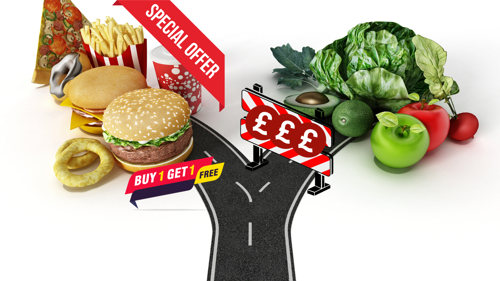The building blocks of a wellbeing economy: An environment that supports healthy food access
08 January 2024
Imagine walking home after a long, exhausting day at work. Lunch was hours ago, and all you want to do is grab a quick dinner to bring home to your family. As you walk to the shop, you pass by a bus stop with adverts for a new vegetable stew on the menu of a local restaurant, which remind you how hungry you are and make you speed up a bit. When you walk into the local grocer’s, you are met with a display of fresh, seasonal fruits. Though you weren’t planning on it, you pick up some extra blackberries to take home.
You reach the ready food aisle and are met with options ranging from vegetable risotto, vegetable and prawn brown rice, veggie enchiladas, and whole wheat spaghetti with vegetable sauce. You pick some up for your family, all ready to be heated up in the oven, and grab a side dish of roasted carrots and parsnips because it’s on offer. As you walk to the checkout, you see that some staples like pasta, eggs, tinned tomatoes, and frozen vegetables are reduced. You pick some up so you don’t have to pay full price when you come back over the weekend. You think about walking to the back of the store to pick up a few more items, but you know that is where the sugary treats are stocked, and you decide that you are too tired and hungry to walk past them now, so you turn to the checkout and go.
Scotland needs to build a wellbeing economy
In this scenario, a person was able to pick up a quick, easy, healthy dinner that their whole family would love, and they weren’t tempted toward unhealthy foods. They weren’t forced to choose between a quick, easy meal and a healthy one. They were able to take advantage of meal deals without buying unhealthy foods. Even though they were tired and busy, their environment was set up to keep them free from temptation, and the foods on discount were regular, everyday foods that they need, so they could save money. They could choose to stay clear of the discretionary, sugary treats when they knew they were likely to be tempted, and they had the freedom to avoid temptation. In short, their environment supported them, rather than steering them toward unhealthy options.
In a time when people are struggling to make ends meet, all of us – people, businesses, and governments – need to play our part in building an economy that puts our health and wellbeing first. To do this, we need all the right building blocks, including jobs, pay, housing, education, and an environment that promotes healthy living.

When these building blocks are weak or missing, such as when low pay, job insecurity, and increased prices for food and housing force people to balance their budget and their health, it has real consequences, as severe as shortened lives. People in Scotland who live in deprived areas are estimated to spend around 25 fewer years of their lives in good health,[1] and are projected to live lives 10 years shorter than those in the least deprived areas.[2]
With such high stakes, it is clear that we need to prioritise an economy designed to support us in living long, fulfilling, healthy lives. The good news is that in its Programme for Government 2023-24, the Scottish Government were clear that a wellbeing economy is a central pillar of its work as it builds a “fair, green and growing wellbeing economy.” We must ensure that this developing vision truly includes all the necessary building blocks of health and wellbeing, including, but not limited to, access to healthy, affordable, easy food.
A food environment that works for our wellbeing, not against it
At the Scottish Obesity Alliance, we envision a future where everyone, no matter where they live, how much money they make, what they do for a living, or how busy they are, should be able to get affordable, healthy, easy, sustainable, and delicious food, free from the influence of junk food marketing. A future where nobody should be forced to sacrifice their health or years of their lives in order to make ends meet. A future where food companies operate around the principles of taking care of the communities they feed, with health-focused, environmentally-friendly, and human rights-oriented practices. A future where the economy is built to support our wellbeing and allow us to achieve our life goals.
As part of a wellbeing economy, we envisage a food environment where:
Healthy food is affordable for everyone
In an economy constructed with the building blocks of health and wellbeing, healthy food won’t be a luxury. We won’t have to balance our budgets and our health, because the food that’s most affordable will be good for us and will also taste great. The food that is put on sale and promoted to us will be the staples that we need to buy and that keep us healthy, like pasta and fruit and veg. This means that when we hit rough patches – losing our jobs, falling ill – not only will our economy help us get back onto our feet, whether we can afford healthy food won’t be another thing to worry about.
Healthy food is the easy option

In an economy constructed with the building blocks of health and wellbeing, we won’t have to resist constant temptation from adverts and promotions – the food that is marketed to us will be good for us and make us feel good. After a long day, we can stop by the shop and our environment will support us in grabbing a quick, healthy meal, free from tempting ads and offers. Children and young people will be protected from junk food marketing, so they can be set up to succeed. Food will be formulated to taste great, be ready to eat when we are busy or tired, and will be sustainably produced, and this food will be available to everyone, regardless of their postcode.
Everyone needs to do their part
People in Scotland need a wellbeing economy that is constructed to allow them to live healthy and fulfilling lives: including jobs that pay a fair, living wage; access to high-quality education to fulfill our dreams; affordable, accessible housing to help us thrive; and an environment that supports active living and healthy eating.
Building this wellbeing economy requires everyone – people, government, and businesses – to play their part. This is a lofty goal, but it is achievable, and some of the work has already begun.
Business
Creating an environment that supports access to healthy food will take the cooperation of businesses who are willing to shift their practices, who care about the communities they serve, and who want to build a long-term, sustainable model that will take them toward success in the future. In a wellbeing economy constructed to support healthy, long lives, businesses would adhere to the function they provide to society. This means that companies whose job it is to feed us would value providing us with food that is good for us and the planet, not food that cuts our lives short.
Some businesses are already exploring actions toward this end. Some manufacturers are working on formulating high-quality foods, and some supermarkets are piloting new layouts that put healthy options at centre stage and make people’s shopping trips easy. We welcome these changes as necessary for everyone’s long-term health and success.
However, on this front there is still a way to go, and too many corporations are doing nothing, dragging their heels, and actively seeking out loopholes in legislation rather than changing their ways. This building block will require a shift in our food system, and it will require food providers to put health at the heart of all of their business practices: ensuring that the majority of their food is healthy and high quality; producing and serving local and sustainably- sourced food; putting healthy foods in the spotlight of their adverts and promotions. And it cannot be done without laws to prevent some corporations with ill intentions from refusing to change.
Government
The Scottish Government has committed to constructing a wellbeing economy, and the required policy, planning, and collaboration has started. Now, the Government must ensure their vision includes the building blocks that enable Scotland to thrive not only economically but also in terms of our health.
Up to this point, some food corporations have shown us that they will not change despite knowing their food is making people sick and cutting lives short. So creating a healthy food environment will require government action like restricting the marketing of unhealthy food and stopping corporations from making healthy foods unaffordable.
The government is already considering several of these policies, such as regulations to restrict what kinds of foods corporations can put on promotion. Now we ask them to recognize a health-supporting environment as a crucial building block of a wellbeing economy, and to follow through on these policies as part of their wellbeing economy plan.
People
People and advocacy organisations have been the driving forces of the movement calling for change. Together, we continue to put pressure on governments and businesses to deliver the change that is long overdue. The SOA would like to thank and appreciate its members for their continued efforts toward a future with a transformed food environment. We are optimistic that as we continue to build this movement, we will gain more and more momentum.
Conclusion
An environment that supports healthy eating is a crucial building block of health, and of Scotland’s wellbeing economy. Our vision of this environment requires people, business, and government to do their part. Though this requires big, long-term changes, progress toward this vision is underway, and this is something we can achieve.
[1] https://www.gov.scot/publications/long-term-monitoring-health-inequalities-march-2023-report/pages/5/
[2] https://www.nrscotland.gov.uk/files/statistics/life-expectancy-in-scotland/19-21/life-expectancy-19-21-report.pdf
